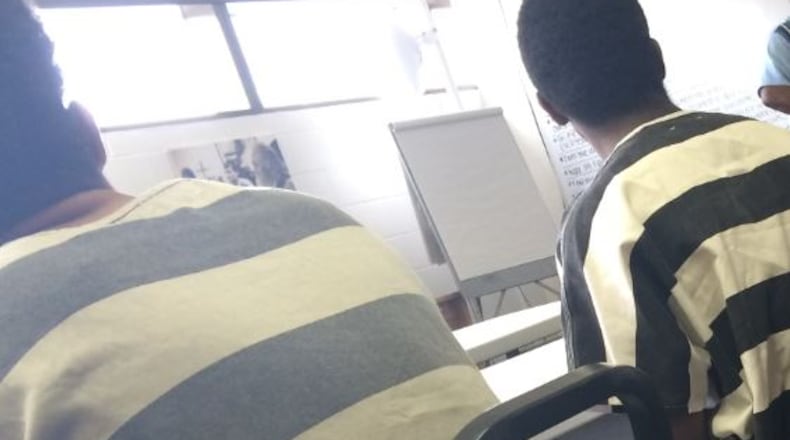RELATED: DeWine: ‘Never seen anything like’ drug crisis hitting Ohio
The chaplaincy also operates Keyvision TV, which produces about 2,300 hours of programming annually to help point inmates in the right direction after leaving the jail, Bailey said.
In Clark County, a record 97 people have died of drug overdoses this year and local law enforcement have responded to more than 1,000 drug overdoses. About 80 percent of the Springfield Police Division’s calls are related to the drug epidemic, local leaders said, including gun violence, thefts and shoplifting, which ultimately leads to jail time.
Bailey and Mata connected through the Clark County Substance Abuse Prevention and Treatment Coalition and began talking about broadcasting the series for inmates inside the Clark County Jail.
“He’s looking to get out there and coach people in recovery and I’m out there to deliver that message for him,” Bailey said.
A portion of the 20-episode project was paid for through a $10,000 grant from the Clark County Prosecutor’s Office, Bailey said. The duo have shot about seven segments so far and are still raising money to produce the rest, he said.
MORE: Springfield hospital grant will increase screenings to battle opioids
They hope to run them monthly and provide curriculum for inmates to go with each episodes, Bailey said. It will also allow them to collect data, he said. Almost all of the curriculum is related to drug education.
“We believe these guys are going to discover some things and it will help them when they get out,” Bailey said. “Most of the time the messages are dealing directly with recovery, substance, chemicals and brain activity. Drug recovery is about changing to another direction. We can identify the addiction all day long … Let’s live our life constructively. With these tools and these steps, they can move further away from the old addiction.”
Mata believes in treatment and using community resources, he said, but addicts also get to a point in their recovery where they say: “What do I do now?” He began putting together the program during his off-hours at home and eventually began posting videos on Facebook.
“It’s a bunch of lessons that I’ve used personally in my life to continue to grow that I still use,” Mata said. “I believe everybody needs clear, written goals and a plan to work toward what they want to accomplish.”
The goal is to help as many people as possible, Mata said.
MORE: Springfield recovery advocate’s overdose death shows relapse battle
“I’ll never be able to help millions of people one-on-one,” he said. “We’re able to bridge what Tony is trying to do with what I’m trying to do.”
The programming and curriculum could be used inside jails, prisons and treatment facilities across the country, Bailey said.
“We would like to be a satellite channel and ultimately (broadcast) across America,” he said.
The chaplaincy recently re-branded itself as the Jonah Project, named after the biblical story of Jonah and the whale. Inmates are similar to Jonah inside the whale, Bailey said, they’re ready to learn and change once they’re released. The re-branding effort was paid for through an in-kind donation from Upward Brand Interactions in Springfield.
“We believe jail time is a window of opportunity to have great impact,” Bailey said. “Their ears are open. They’re sober. They start to clear up. Anything that’s going to be good for them, they’re more likely to receive.”
MORE: $175K grant will increase addiction care at Springfield health center
The branding change will also distinguish the chaplaincy — a nonprofit organization — from the Clark County Sheriff’s Office. The chaplaincy isn’t employed by the jail but works in partnership with it, Bailey said. The organization’s goal is to build trust, cultivate change and hopefully find a new path for inmates, he said.
Bailey also hopes to partner with businesses to create programming for inmates to prepare them to get jobs once they’re released, he said.
“They can hear from employers about what to expect,” Bailey said. “There are some workers in there and they need some training. Let’s take advantage of this idle time.”
SPRINGFIELD’S OPIOID WAR
‘Perfect’ Springfield couple battles addictions, finds recovery
Springfield native living clean, successful after prison, addiction
Addicts, family members share stories at Springfield recovery banquet
More prevention needed to curb opioid epidemic in Springfield
New program seeks to reach Clark County overdose patients, save lives
Safe h ouses for Springfield overdose patients might save lives
Drug epidemic wreaking havoc on Clark County businesses, economy
Drug crisis traumatizing children in Clark County, state
Money used to fight Clark County drug crisis at risk
More than 100 Clark County law enforcement officers to get Narcan kits
Springfield examines officer, medic safety after Ohio police overdose
Demand for, debate over Narcan soars in Springfield
20 more overdoses in Clark County during 25-hour stretch
Clark County sees another big spike of at least 40 overdoses in 5 days
Clark County leaders pledge to fight addiction stigma, OD crisis
Clark County to charge addicts who OD and don’t seek treatment
Overdose epidemic spreads, strains Springfield first responders
Clark County drug overdoses double in 24-hour spike
ABOUT THIS SERIES
The Springfield News-Sun has written extensively about opioid and heroin problems in Clark County in the past five years, including stories about multiple overdoses in one weekend and efforts to expand treatment options. This year, the News-Sun will take a deep dive into the community’s drug epidemic and what local leaders are doing to solve the problem.
By the numbers
97: Unconfirmed, suspected drug deaths so far this year, a record number*
82: Confirmed drug deaths in 2017
79: Confirmed drug deaths in 2016
Source: Clark County Coroner’s Office
* Total as of Oct. 10
About the Author

